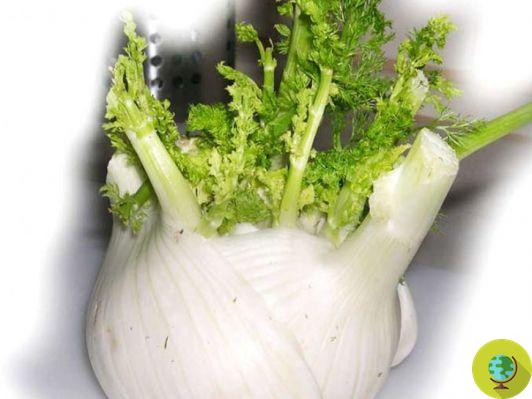
Fennel: what are its properties and benefits? Used since ancient times for its aromatic and digestive properties, fennel has a flavor that somehow recalls that of anise and comes in two varieties: sweet fennel and bitter or wild fennel
Don't store avocado like this: it's dangerous
Fennel: what are its properties and benefits? Used since ancient times for its aromatic and digestive properties, fennel has a flavor that somehow recalls that of anise and comes in two varieties: fennel Dolce and that bitter o wild.
The white sheath at the base is eaten of the sweet fennel; the second, on the other hand, is exploited for the aromatic properties of semi, used to enrich the taste of bread, cold cuts, herbal teas or liqueurs.
Vendors also distinguish fennel in male e female based on the morphological characteristics: the male has a rounder shape and is more suitable to be eaten raw, the female instead is more elongated and is suitable for cooking.
Properties and uses of fennel
Fennel is composed of about 90% water - therefore it is an excellent diuretic and digestive -, 1,3% protein, 3% fiber, 1% ash and carbohydrates. The minerals present are potassium, calcium, phosphorus, sodium, magnesium, iron, zinc, manganese and selenium. And among the vitamins we find vitamin A, some belonging to group B and vitamin C.
Fennel fruits also contain a essential oil rich in anethole (about 80%) which is used in the preparation of different liqueurs.
In dietetics, the fruits are used in liquor, pastry and as flavorings of cured meats and appetizers. Raw, stems and leaf sheaths are consumed in salads or to give flavor to broths and roasts. In herbalist's shop e phytopharmacy, on the other hand, fennel is indicated against problems of digestion, heaviness of the stomach, flatulence, meteorism, colitis, digestive atony and inflammation of the airways. It also has estrogenic, anti-fermentative and expectorant activity.
Furthermore, fennel is a starch and lipid-free vegetable, therefore low in calories and suitable for those who follow a slimming diet. Being rich in flavonoids o phytoestrogens, natural estrogenic substances, fennel also has a balancing effect on female hormone levels, promoting the regularization of the menstrual cycle and the prevention of breast cancer. It acts on the liver by improving liver function and acts on the nervous system by preventing or relieving muscle spasms.
Where it is
Fennel can be found fresh in any fruit and vegetable in the winter months. Be careful to buy only fennel with a beautiful white color, with firm and compact sheaths and with leaves on the stems of a beautiful bright green. The best way to store it is in the fridge in a perforated plastic bag and consume it shortly if you want to enjoy its aromatic and intense flavor.
Fennel can also be frozen, after cutting it into wedges and blanching it for 4-5 minutes. Before freezing it, let it cool in the water where it was blanched.
The infusions and herbal teas of leaves and fennel seeds are normally found in the supermarket, but also in herbal medicine or in pharmacies with homeopathic sector.
Germana Carillo
Read also:
- Fennel Seeds: 10 Amazing Health Benefits


























